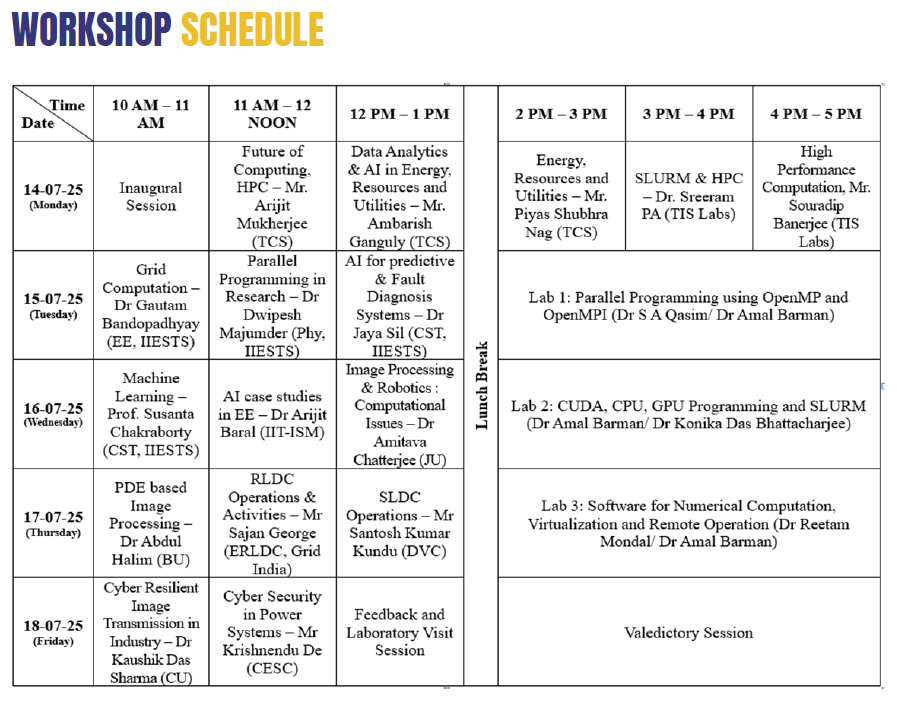Electrical Engineering Department
Indian Institute of Engineering Science and Technology, Shibpur
Botanic Garden, Howrah, West Bengal, India
PIN 711 103
(IIEST, Shibpur to Kolkata Airport – 25 KM, Howrah Station – 8 KM, Sealdah Station – 12 KM)
Electrical Engineering Department
Indian Institute of Engineering Science and Technology, Shibpur
Botanic Garden, Howrah, West Bengal, India
PIN 711 103
(IIEST, Shibpur to Kolkata Airport – 25 KM, Howrah Station – 8 KM, Sealdah Station – 12 KM)
** List may grow further
DVC, TISLabs, Jupiter Computers
| Delegates | Indian |
| Student/Research Scholar/Teaching Assistant | INR 1500.00 |
| Faculty | INR 3000.00 |
| Industry Person | INR 6000.00 |
The registration fee covers Tea, Snacks, Lunch (5-Days). It also includes Workshop Kit, Study Materials and Certificates. Registration Fee may be paid in favour of “CONTINUING EDUCATION CENTRE – BESUS”. The Registration Fee can be paid electronically (e-payment) through SWIFT/NEFT/UPI ID – 9432104410m@pnb. After completing the full payment, please fill up the google form with all the payment details for registration at https://forms.gle/bcHqNDMVjxusQJTP9.
The details of Bank A/C are given below: A/C Name: CONTINUING EDUCATION CENTRE- BESUS, A/C No: 1532010011963, Bank: PUNJAB NATIONAL BANK, Branch: BESUS, IFSC Code: PUNB0153220, SWIFT CODE: PUNBINBBXX.

For Registration
Dr. Reetam Mondal, Department of Electrical Engineering, IIEST, Shibpur, Howrah,WB, PIN 711 103, Email: reetam.ee@faculty.iiests.ac.in
Dr. S.A. Qasim, Department of Electrical Engineering, IIEST, Shibpur, Howrah, WB, PIN 711 103, Email: qasim.ee@faculty.iiests.ac.in
For Sponsorship/Advertisement
Dr. Amal Barman, Department of Electrical Engineering, IIEST, Shibpur, Howrah, WB, PIN 711 103, Email: ab@abee-iiests-ac-in
Dr. Konika Das (Bhattacharya), Department of Electrical Engineering, IIEST, Shibpur, Howrah, WB, PIN 711 103, Email: kdb@ee.iiests.ac.in
14 to 18 July, 2025

IIEST, Shibpur
IIEST, Shibpur (Erstwhile “Bengal Engineering College”) is the first college to become Indian Institute of Engineering Science and Technology (IIEST) in India in 2014. The Institute has a rich history. It is empowering the nation since 1856. Considering the year of establishment, it is the 3rd engineering college in India but considering the year of graduation it is the 2nd oldest engineering college in India. It has 16 departments and 8 schools. It has over 250 faculty members and a student strength of over 4000.
Electrical Engineering Department
The Department of Electrical Engineering at IIEST Shibpur is one of the oldest and among the best in the country providing dynamic and scholarly environments wherein students learn independently and in collaboration with others to develop a disciplined yet innovative approach to their careers as professional engineers, researchers or teachers. The department offers an 8-semester undergraduate B.Tech course, a 10-semester dual degree (B. Tech. and M. Tech.) course and 4-semester postgraduate M.Tech. degree course in Electrical Engineering. The department also offers research programs leading to a Ph.D. degree. The department started its journey way back in the year 1912-13 and produced its first batch of graduate electrical engineers in 1936 in the erstwhile Bengal Engineering College, Shibpur. Post-independence, when the nascent nation had just started building the power plants that have been instrumental in realizing the dreams of modern India, many of the visionaries, planners and implementers were the students of this department. The postgraduate degree was first offered in 1955 and the first Ph.D. Scholar from the department came out in 1959. The faculty members of the department are vibrant combinations of experience and innovation. Other than excellence in teaching, they have also proven their worth by publishing papers in peer-reviewed journals and prestigious international conferences, authoring text and reference books, producing patents and successfully implementing state-of-the-art R & D projects. In the last few years, several research projects with a funding of few crores have been executed (funding from Central Government agencies) However, more than 10 research projects have also been funded by non-Government agencies. At present, about 15 different funded projects are being executed in the department.
This five-day workshop/seminar is designed to provide a comprehensive understanding of High-Performance Computing (HPC), SLURM, CUDA, Artificial Intelligence (AI), Power System Load Dispatch, and Cyber Security for Power Systems. The program combines theoretical knowledge with practical hands-on experience, making it ideal for professionals and students alike.
Who Can Benefit
Benefits of Attending